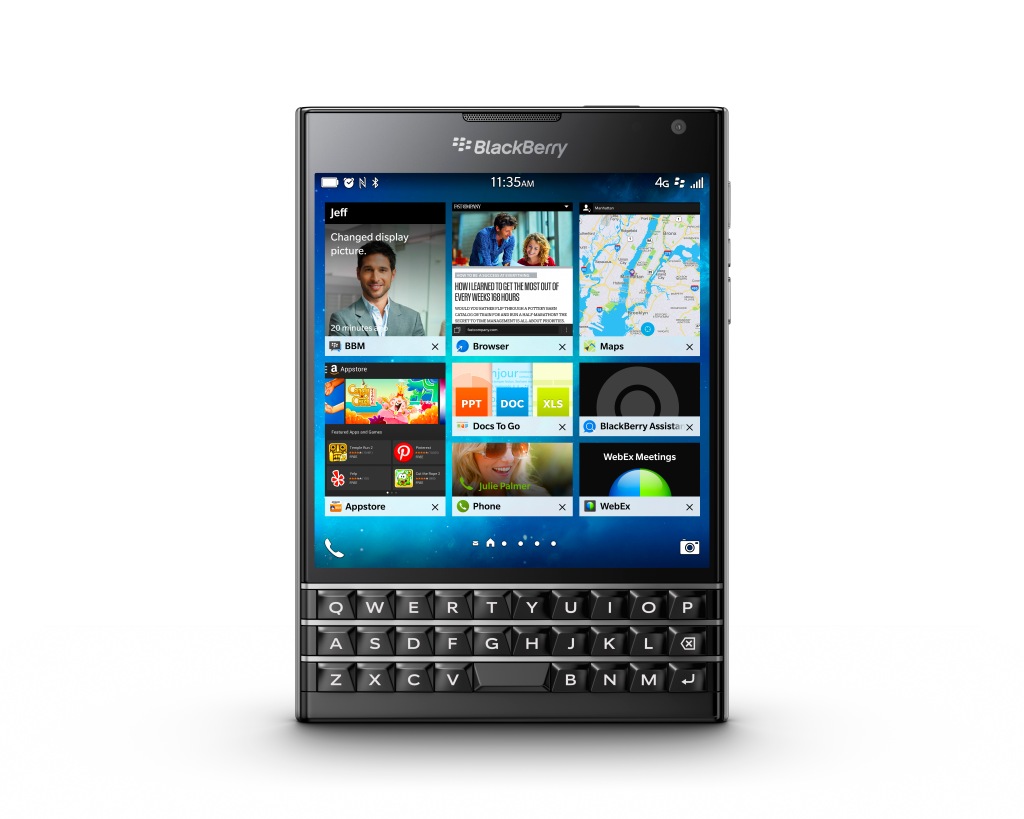On Wednesday I spoke to Michael Clewley, Director for Handheld Software Product Management at BlackBerry, after the company unveiled its latest device, the Passport. “My role is specifically to oversee the software aspects of our devices and launch,” he says. He played that role for the BlackBerry PlayBook, and the BlackBerry 10 phones, so it made sense for me to start my questioning with a glance at the company’s past.
***
Takeaways:
*Blackberry has tried to learn useful lessons from less-than-stellar past experiences
*The latest version of its Operating System – 10.3, making its debut appearance on the Passport – offers a potentially game-changing content partnership with Amazon
*Reports that BlackBerry is trying to quit the hardware (devices) space and reinvent itself as a wholly software company are exaggerated.
***
Are there any lessons from the Playbook that influenced the Passport, considering that the PlayBook did not do quite as well as company would have liked.
I think BlackBerry’s probably learned a couple of lessons in general from the PlayBook: Don’t overhype a product before its ready to launch; don’t launch a product before its ready to launch, [CEO] John Chen’s been very clear about that, [the need] to have the right product, the right quality, the right experience, when you’re launching a product. It’s very important to have all that as part of your holistic product launch. The other thing we’ve done for Passport is really articulate and identify who the product is for, upfront. It’s not something we necessarily did well for even the BlackBeryy 10 launch, and definitely didn’t do necessarily well for the Playbook – we touted it as this grandiose tablet when it was really more something that was a companion experience to your existing BlackBerry smartphone. With Passport, as a company we’ve done really well about talking about how it’s for a specific user, describing the user in detail and then building the story and all of our marketing messaging around that.
When I heard you talk about the newly launched BlackBerry Blend it seemed to me like it was a more sophisticated version of Bridge
Yes, Bridge is definitely an early ancestor for Blend. In multiple ways, both from a technology aspect and from a holistic product offering aspect. That idealism, this ability to have two devices working together in a way but [also] have the security be inside a particular aspect and not have to worry about your information on the other device. Bridge was about that and Blend inherited it and became this whole other thing.
When the BlackBerry 10 launched app compatibility was a problem – there weren’t enough native apps, e.g. Instagram was missing. How do you think that might affect uptake of the Passport?
That’s why we’ve announced and are now seeing this partnership with Amazon happen. With 10.3 and Passport we have the dual app store strategy. BlackBerry World is what we’ll be using to focus our efforts on bringing the productivity and the business type of applications and [driving] those kinds of applications specifically, and then the Amazon app store is where you’re going to find the more consumer-oriented applications. Amazon is a large company; they’ve got lots of muscle strength out there so they have the ability to go get the top names and top applications and bring those to their store, and we get the benefit of that.
Let’s talk about the tension between being a software and a hardware company. What are your thoughts on that, and do you think that tension is to be found across the entire industry – or does BlackBerry more acutely face that challenge of balancing the different identities?
We have always been a hardware-specific company – we have software, but it was definitely a smaller part of our business. What John [Chen] has been really great at doing is getting the company across the board to really think about a balanced approach to making money. It’s kind of like if you’re an investor, you’re going to invest in a balance of areas across the board. You’re not going to say I’m only going to invest in bonds, or I’m only going to invest in mutual funds, because you’re either not going to get returns or you’re not going to make as much money as you could. Or sometimes you’ll [even] lose money because you’re [overly] focused on a specific area.
For us the way John has really got us starting to think is that the handset division needs to make money, the software division needs to make money, and those two will make money and help the overall goal and the bottomline of the company. It’s sort of where our head is at, and because we have this end-to-end experience we’re able to have a great device and also have a great software solution that manages that device and other devices as well.
Do you think the same dilemma – of balancing hardware and software ambitions – would apply across the industry, i.e. among competition?
The android OEM (Original Equipment Manufacturer) vendors get the software from someone else and then they have to do something on top of it to make it differentiated, if they want. But they don’t own any other aspect. None of them are in the MDM (Mobile Device Managament) space like we are. And even Apple, yes they own both hardware and software, but they’re also not in the MDM space, so they rely on others to do things for them. Whereas we own software and hardware and the management and security and the infrastructure that connects it all together, so we’re better positioned to do a lot [more].
